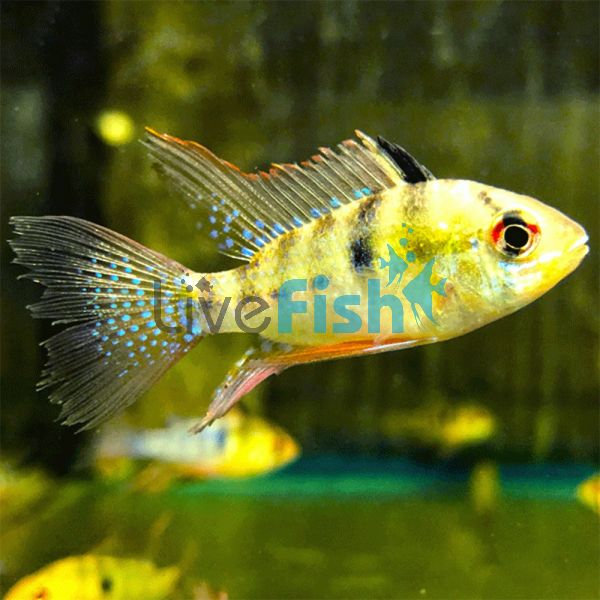Blue Ram Longfin 5cm
- Buy 2 for $23.52 each and save 10%
- Buy 4 for $20.90 each and save 20%
- Buy 6 for $18.29 each and save 30%
Ramirezi Blue Longfin
One of the world's most popular dwarf cichlids is the blue ram. It has a wide array of striking and bold colours, a great personality, along with the perfect size for those keeping smaller aquariums. Because of these reasons and their slight challenge to keep, they are a highly demanded fish globally. To take these beloved fish further, the art of selective breeding has introduced the longfin gene, which results in a truly magical fish.
Originating from South America, the blue rams will develop a rainbow of colours through their body. When adult size, they will have a range of oranges, yellows, reds, pinks, purples, whites, blacks, and as their name suggests, a metallic blue sheen and star-like patterning which makes them an absolute spotlight in the aquarium. Their colours work in such a way that it is both a perfect blend and an eye-catching contrast. Their long, veil-like fins trail behind them like silk and really stand out in tanks with dark substrates or thick greenery. Coupled with their bold personalities, these fish quickly win over many aquarists. Blue rams however, are considered to be a slightly sensitive fish as they do require stable and clean water parameters as well as a slightly higher temperature when compared to most community fish.
Their care is often regarded to be similar to the prized discus, which is why blue rams and discus are often kept together. Blue rams are regarded as a community fish as they are peaceful and remain fairly small at 7cm max. They are also bred fairly easily in captivity, and differentiating males and females is possible where the male's body is more elongated than that of a female, the male's dorsal fin ends in more of a point. However, the best method to identify is to get a pack of 4-6 rams and let them naturally pair off.
Tank Recommendations for your Ramirezi Blue Longfin
Being a dwarf cichlid, Longfin rams can be kept in smaller aquariums however, the minimum would be around 60 litres. As always, though, a larger aquarium would be far better, and making sure there is a decent floor space can avoid any territorial behaviour that longfin blue rams may exhibit.
A sand or small-grain gravel substrate would be fine for these fish as they do routinely sift through the substrate looking for food. Longfin rams should be kept with others of their kind to make them feel comfortable and be more active in the aquarium, this may also reduce the aggression they could show to other fish. They are also a soft water fish, meaning they require a low PH. They can be kept in PH as low as 6, which makes them a great planted aquarium species.
Suitable Tank Buddies
The Longfin ram is a fairly peaceful fish that may only display aggression in territorial disputes; however can be kept with a wide range of community fish. Fin-nipping species, however, should be avoided.
Usually Compatible
Discus, Angelfish, cardinal tetras, Corydoras, and other balloon ram strains.
Sometimes Compatible
Larger peaceful South American cichlids such as Uaru can work however, there is a chance these fish may outcompete the rams. Species like tiger barbs, rosy barbs, and fin-nipping species may also pose a risk to these longfin fish. Longfin rams are mostly bottom-dwelling, so fish that would not interfere with their feeding are recommended.
Rarely Compatible
Large and aggressive species such as oscar,s which may prey on the balloon sunshine gold rams.
Feeding your Ramirezi Blue Longfin
Longfin rams just like any fish, though they should be fed a varied diet with a mix of different foods. The ideal diet would be a good quality micro slow sinking pellet or crushed flake, supplemented with frozen bloodworms or black worms, or even live foods like baby brine shrimp or micro worms in very small portions.
| Scientific Name | Mikrogeophagus Ramirezi |
|---|---|
| Care Level | Moderate |
| Common Names | Longfin Blue Ram, Longfin German Blue Ram |
| Diet | Carnivore |
| Fish Family | Cichlidae |
| Lifespan (years) | 4 |
| Max. Length (cm) | 7 |
| Min. Tank Volume (l) | 60 |
| Origin | South America |
| Sociability | Peaceful |
| Venomous | No |
| Water Conditions | 26°-30° C, pH 6.0-7.0 |
| Plant Safe | Yes |




